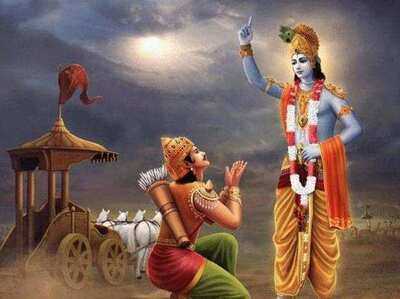
Heartbreak isn’t loud at first. It starts in silence—the pause before checking your phone, the slow realization that the warmth in someone’s voice has faded, the weight of words left unanswered. It is, more than anything else, the quiet collapse of what we thought would be. Because that’s what really hurts, doesn’t it? Not just the loss of a person, but the loss of the future we imagined with them. We weren’t just in love; we were in love with the idea of how it should go. And when reality doesn’t match the script we wrote in our heads, it feels like something has been taken from us. But was it ever ours to begin with? This is where the Bhagavad Gita—a text about war, duty, and the nature of life—gives us a startling answer to the universal ache of human attachment: The problem isn’t that we love. The problem is that we expect.
1. The Source of Suffering

Expectations create control; reality rarely follows our script.
In the Gita, Krishna tells Arjuna:
"You have a right to your actions, but never to their fruits."
It’s a simple statement, but it holds within it the reason why we break our own hearts. We attach ourselves not just to people, but to the idea of what they should be for us. We think, If I give love, I should receive it back. If I do everything right, they should stay. If I open up, they should never hurt me.
And yet, how often has life followed the script we wrote? Expectation is control disguised as hope. We love, but we also measure. We give, but we also wait for a return. And the moment reality takes a different path, we suffer—not because we lost love, but because we lost our illusion of control.
2. Love Without Chains

Love freely, without demanding a specific outcome.
Krishna doesn’t say, Don’t love. He doesn’t say, Detach yourself from the world. He simply says, Detach yourself from the result. Love people, but don’t bind your happiness to what they do with that love. Act, but don’t hold the outcome hostage to your desires. Does this mean you let people walk all over you? No. It means you recognize that your worth was never in their hands to begin with. You are not defined by someone’s ability to see your value.
This isn’t about being cold or distant. In fact, it’s the opposite. When you stop demanding certainty, you start loving more freely. You listen without waiting for the perfect response. You give without keeping score. You experience life as it is, instead of constantly comparing it to what you wanted it to be.
3. The Power of Letting Go

Surrender isn’t weakness; it’s choosing peace over control.
Most people think surrender means weakness. The Gita teaches otherwise. Letting go isn’t giving up—it’s choosing peace over control. It’s the difference between carrying a weight and setting it down. We fear that if we stop expecting, we’ll lose everything. But what if the opposite is true? What if, by releasing our grip, we make space for something deeper? What if real love isn’t about guarantees, but about presence—being here, fully, without the desperate need to mold the future into what we think it should be?
The truth is, nothing lasts forever. People change. Feelings shift. Love is not a contract, and life does not owe us the story we imagined. But if we can love without clinging, act without demanding, and live without fear of loss, we might just find that we were never meant to possess anything in the first place—only to experience it while it’s here. And maybe, just maybe, that’s enough.
 Heartbreak isn’t loud at first. It starts in silence—the pause before checking your phone, the slow realization that the warmth in someone’s voice has faded, the weight of words left unanswered. It is, more than anything else, the quiet collapse of what we thought would be. Because that’s what really hurts, doesn’t it? Not just the loss of a person, but the loss of the future we imagined with them. We weren’t just in love; we were in love with the idea of how it should go. And when reality doesn’t match the script we wrote in our heads, it feels like something has been taken from us. But was it ever ours to begin with? This is where the Bhagavad Gita—a text about war, duty, and the nature of life—gives us a startling answer to the universal ache of human attachment: The problem isn’t that we love. The problem is that we expect.
Heartbreak isn’t loud at first. It starts in silence—the pause before checking your phone, the slow realization that the warmth in someone’s voice has faded, the weight of words left unanswered. It is, more than anything else, the quiet collapse of what we thought would be. Because that’s what really hurts, doesn’t it? Not just the loss of a person, but the loss of the future we imagined with them. We weren’t just in love; we were in love with the idea of how it should go. And when reality doesn’t match the script we wrote in our heads, it feels like something has been taken from us. But was it ever ours to begin with? This is where the Bhagavad Gita—a text about war, duty, and the nature of life—gives us a startling answer to the universal ache of human attachment: The problem isn’t that we love. The problem is that we expect.


